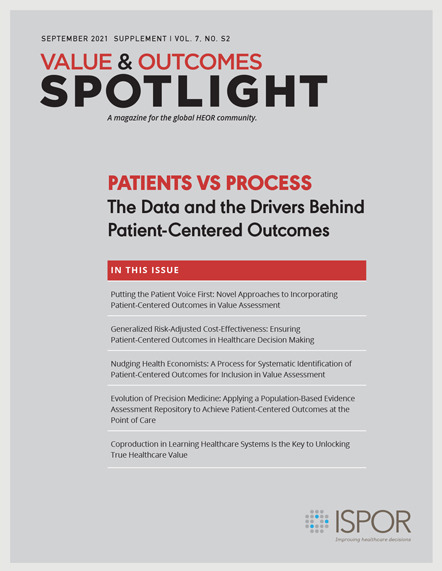Putting the Patient Voice First: Novel Approaches to Incorporating Patient-Centered Outcomes in Value Assessment
Eileen Cannon, President, Pharmaceutical Research and Manufacturers of America Foundation, Washington, DC, USA
For more than 55 years, the PhRMA Foundation has been helping advance scientific research and innovation to benefit patients. Our mission is to improve public health by proactively investing in innovative research, education, and value-driven healthcare. Illustrative of this objective is our Value Assessment Initiative that promotes the development of advanced value assessment frameworks and methodologies that are rigorous, transparent, and address the needs of all healthcare stakeholders, including patients, payers, and providers. Recently, we have sharpened our focus on patient centricity and health equity as key pillars of the value assessment framework development process.
In 2017, we began funding the Challenge Awards as a way to foster new, innovative research concepts that can build on a growing field of study aimed at advancing patient-centeredness in value assessment. Each year, a pressing question related to value assessment in healthcare is distributed and researchers are invited to submit proposals in response.
High-quality and efficient healthcare should seek to improve outcomes that matter most to patients and society. Efforts to measure value in healthcare should recognize that the value of an intervention may vary depending on the outcomes it produces in treating a specific disease or according to the characteristics and preferences of the patient. However, increasing focus on patient-centered health services research has revealed gaps between the outcomes that patients report are most important to them and the outcomes traditionally measured in value assessment.
"We have sharpened our focus on patient centricity and health equity as key pillars of the value assessment framework development process."
As such, there is increased recognition that if value assessment is to play a more meaningful role in healthcare decision making in the United States, better definitions and methods for assessing value must be developed to appropriately account for patient perspectives.
Patient-centered outcomes can be defined as the outcomes important to patients in the way they experience a disease or a treatment for that disease. Patient-centered outcomes may include a range of measures: clinical (mortality, biomarkers), patient-reported outcomes (symptoms, function, preferences), treatment-related attributes (mode of administration), resource availability and use (hospitalizations), and/or societal impacts (productivity, caregiver burden).
In addition, small differences in individual characteristics—such as age or health status, race and ethnicity, and personal experience—as the result of systemic barriers (eg, bias and discrimination), biological differences, and personal preferences can significantly alter a medicine’s clinical effect or patients’ perceptions of value.
"Until significant progress is made to capture, measure, and operationalize patient-centered outcomes, defining the true value of a healthcare intervention will remain a challenging endeavor."
Important patient-centered outcomes and patient differences are often omitted from traditional approaches to value assessment methods and processes, which tend to focus on a selected subset of clinical outcomes simply because these are the endpoints studied in trials.
In this special supplement to Value & Outcomes Spotlight, we are very pleased to share our 2020 Challenge Award-winning papers that inform the development and inclusion of patient-centered outcomes into value assessment.
The 4 winning teams were selected from among dozens of submissions that sought solutions to the following question: What approaches are needed to consistently and reliably incorporate patient-centered outcomes in value assessment for both population- and individual-level healthcare decision making?
The 2020 Challenge Award papers in this series include a novel approach to measuring disease severity in economic models1; a set of practical guidelines for identifying and including patient-centered outcomes in value assessment2; a framework to empower care teams to ensure treatment decisions are tailored toward patient needs3; and a demonstration for how the coproduction method can improve the healthcare system for people with a specific disease state—in this case, epilepsy.4
These efforts—and the work of many others—are having a meaningful impact on ensuring that value assessment reflects what matters most to patients. Until significant progress is made to capture, measure, and operationalize patient-centered outcomes, defining the true value of a healthcare intervention will remain a challenging endeavor.
The PhRMA Foundation is pleased to share the work of these leading researchers in the field of value assessment and encourages Value & Outcomes Spotlight readers to share these award-winning concepts with your colleagues. •
References
1. Lakdawalla DN, Phelps CE. Generalized risk-adjusted cost-effectiveness (GRACE): ensuring patient-centered outcomes in healthcare decision making. Value & Outcomes Spotlight. 2021;7(suppl 2):S5-S10.
2. Mattingly II TJ, Slejko JF, Oehrlein EM, Perfetto EM. Nudging health economists: a process for systematic identification of patient-centered outcomes for inclusion in value assessment. Value & Outcomes Spotlight. 2021;7(suppl 2):S15-S19.
3. Watanabe JH, Tarn DM, Hirsch JD. Evolution of precision medicine: applying a population-based evidence assessment repository (PEAR) to achieve patient-centered outcomes at the point of care. Value & Outcomes Spotlight. 2021;7(suppl 2):S20-S22.
4. Fureman BE, Farrell KM, Kukla A, Buchhalter J. Coproduction in learning healthcare systems is the key to unlocking true healthcare value. Value & Outcomes Spotlight. 2021;7(suppl 2):S11-S14.

